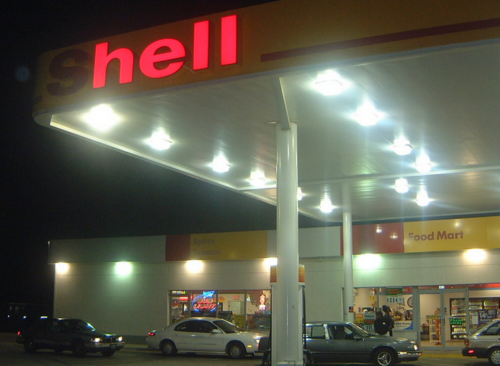This post really should have been titled:
“GAS STATIONS SUCK: AMERICANS CRAVE RANGE TO AVOID THEM“.
It’s true. American car drivers travel less than 50 miles a whopping 98% of the time, yet that somehow is falsely interpreted by pundits as a worry about having long range.
The fixation on mileage may be misplaced, however, given Americans don’t actually tend to go all that far when they get behind the wheel. A 2022 study from the US Bureau of Transportation Statistics showed more than half of all daily trips – by any mode of transportation – were fewer than 3 miles (4.8km). In fact, only 2% were longer than 50 miles (80.4km).
What’s really going on? Americans absolutely hate being in or having to deal with a gas station.
Internet service providers ranked second-lowest on a list of 43 consumer industries, outperforming only gas stations.
The misery of pumping gas, due to private yet centrally planned and controlled fuel distribution spots, has created an expectation of “range” to stay away from dealing with the gas service providers more than any actual need for travel distance.
I’ll say it again, American “range” anxiety is entirely because gas stations suck. It has almost nothing to do with driving far, or even dreaming about some long range destination, it’s “how long before I’m back in gas station hell”.

Meanwhile, quality of life actually improves if the act of stopping at places people like to spend time also means their car is refueled, such as having nice lunch, visiting with others, taking a view or a nap. It’s like a horse being fed and watered when the rider dismounts at any destination. Natural, sensible.
The EV should have been able to target the gas station anxiety (capitalize on the inversion of models) to promote distributed, decentralized charging (refuel anywhere, anytime, from anything) as true freedom. Alas, Tesla stepped in and ruined the conversation with dumb “range” propaganda that falsely promoted itself instead.
The simple fact that Americans travel such short distances in their car ironically is the reason why grossly deceptive Tesla range fraud wasn’t exposed and discussed more widely early in its existence.
Tesla is facing a class-action lawsuit filed by customers who say they were misled by the company’s exaggerated range claims. The lawsuit was filed yesterday, days after a report revealed that Tesla exaggerated its electric vehicles’ range so much that many drivers thought their cars were broken.
Falsely advertising 300 mile range fantasies while delivering half that or less in reality, hasn’t hit Americans hard because so rarely did they actually drive far distances. They did complain however about their Tesla dashboard software, designed to lie, engineered for zero integrity.
Tesla employees had been instructed to thwart any customers complaining about poor driving range from bringing their vehicles in for service. Last summer, the company quietly created a “Diversion Team” in Las Vegas to cancel as many range-related appointments as possible.
The disaster was self-inflicted, as a Lance Armstrong level of carefully created evil, where fake victories were celebrated as a “net” improvement. Elon Musk arrogantly gambled that nobody ever would hold Tesla accountable for cheating.
The directive to present the optimistic range estimates came from Tesla Chief Executive Elon Musk, this person said. “Elon wanted to show good range numbers when fully charged,” the person said, adding: “When you buy a car off the lot seeing 350-mile, 400-mile range, it makes you feel good.” […] Driving range is among the most important factors in consumer decisions on which electric car to buy, or whether to buy one at all. So-called range anxiety – the fear of running out of power before reaching a charger – has been a primary obstacle to boosting electric-vehicle sales.
There you have it. Elon Musk inflamed unfounded anxiety and false fears in order to aggressively proclaim he was the only one who could save people from short range when that was NOT the actual anxiety.
This bait and switch certainly impacted better engineered cars like the Nissan LEAF, which had been the best selling battery electric vehicle into 2019 with an honest range about the same as the actual Tesla range… again, about half of the fake range Elon Musk advertised.
It’s a notorious fascist strategy to artificially corner people using fear into becoming radical “believers”, a tactic very harmful to any market. Not only is Tesla undermining fair commerce with their overt swindles (stealing real business to replace it with fraud), more generally they completely disrespect law and order with highly planned deception.
Now, in some obviously related news today:
The founder of an electric truck start-up that was popular in the US has been sentenced to four years in prison.
Trevor Milton, who led Nikola Corporation, was convicted of fraud last year after a jury found he had lied persistently about the company.
[…]
“Over the course of many months, you used your considerable social media skills to tout your company in ways that were materially false,” said Judge Edgardo Ramos.
“What you said over and over on different media outlets was wrong,” the judge added.
It is hard to believe Elon Musk wasn’t thrown in jail for the exact same fraud by 2019. Hundreds of people are dead unnecessarily, the blood on his hands far worse than any other car company. Why are the egregious crimes of Musk so slow to be prosecuted, leaving so many dead, yet his philosophical peers like Milton, Holmes, and Bankman-Fried already are being locked up?